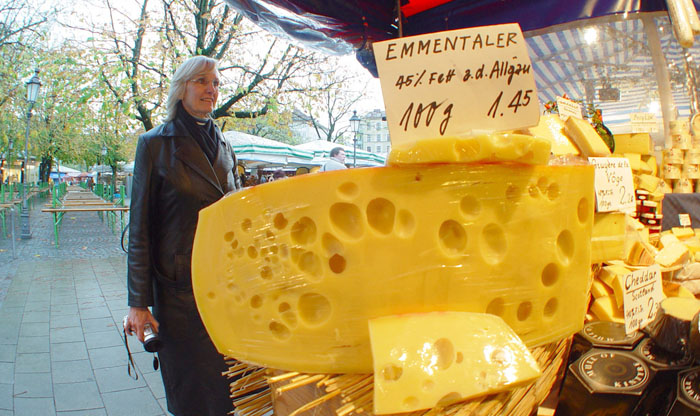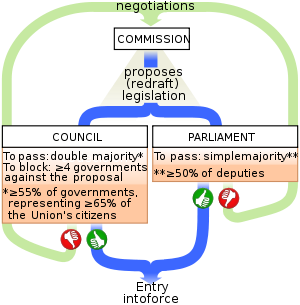The EPP is the Christian Democrat (and largest) grouping in the European Parliament, and includes many several governing parties, such as Ireland's Fine Gael party, Angela Merkel's Christian Democratic Union, Polish Prime Minister Donald Tusk's Civil Platform, and Greece's New Democracy. (It doesn't include, of course, David Cameron's Conservative Party, who took the Tories out of the EPP's grouping and set up a more Eurosceptic grouping - European Conservatives and Reformists, which is basically the Tories with a smattering of of other odds and sods of European elections sitting like sprinkles atop the Tory Eurosceptic cake). They selected former Luxembourgish Prime Minister and Eurogroup President, Jean-Claude Juncker as the man for the job meaning, in the normal run of things, that one could expect Juncker to be the new President should the EPP emerge as the dominant force in the European Parliament after May's elections.
The choice of Juncker has, interestingly, given rise to a certain amount of commentary about his smoking and drinking habits, about which I had previously been unaware.
Consider this:
Now they're talking... So Juncker drank? What a surprise: http://t.co/VdsyUnA5VD via @WSJ
— Pierre Briançon (@pierrebri) January 8, 2014
And then this gem from a Brussels gossipy twitter account:
AAahaha. Twitter timing at its absolute very best from @spiritsEUROPE . *hat-doff*. #EPPDublin #Juncker. pic.twitter.com/Je2WCnDKsK
— Berlaymonster (@Berlaymonster) March 7, 2014
It should be noted that Juncker's Eurozone successor belongs to the Party of European Socialists whose candidate Martin Schultz is Juncker's main opponent for the job of Commission President. Still...
That sort of tittle-tattle is by the by, for now at least. The bigger point is, of course, that the European Union rarely works according to the normal run of things, and even when it does, it often appears to be designed to confuse its citizens. Below is a simple chart explaining how the EU works, just to prove my point.
 |
| (Source: Wikipedia) |
So let's try and make it simple.
Firstly, there is the Commission. The Commission is a cross between the EU's civil service and its executive or cabinet. It proposes and drafts legislation (directives or regulations, depending on the circumstances. I won't bore you with the difference: "direct effect" is enough to make any law student run screaming for their mother, let alone a lay reader). The President of the Commission is the job we are talking about that is up for grabs, replacing outgoing Commission President Jose-Manuel Barrosso who has served two terms.
The Commission president is the grand fromage / großen Käse / queso grande / gruba ryba of the European Union, and each country gets to propose one Commissioner. The Lisbon Treaty was meant to end this practice, when somebody had the clever realization that a 27 (now 28)-member Commission was probably a bit too big. But Ireland threw its dummy out of the pram when it voted No to the Lisbon Treaty the first time round, and one of the changes that
 | ||
| Jose-Manuel Barrosso (r) meets a citizen of the EU |
The European Parliament is basically the lower house of the European Union. Its members are directly elected in elections that take place every 5 years. The next ones are in May.
The European Council is the collective presidency of the EU, made up of the head of government of each member state: David Cameron, Angela Merkel, Enda Kenny, Donald Tusk etc. It proposes to the Parliament the candidate for Commission President. (Just to confuse matters more, there is also the 'upper house' of the European legislative process, the Council of the European Union, which is kind of like the European Council, but is instead composed of national ministers meeting to discuss issues for which they have direct responsibility, such as communications or trade. It used to be called the Council of Ministers, but in trying to make how Europe works seem clearer for its citizens, the eurocrats decided that the best way to do that was to have a European Council and a Council of the European Union. It has no role in the selection of the Commission president. Oh, and there is also the Council of Europe, but that has nothing to do with the EU, so we are not even going to go there). Let's just call the European Council "the Council" for now (even though in the diagram below whereby refers to the 'Council', in the normal legislative process it means the Council of the EU/Council of Ministers. Simple, right...?)
The Treaty on European Union says that it is the Parliament's job to elect the President (of the Commission, you understand. The Parliament has its own President, as does the Council...)
So far so good.
The Treaty also says that it is the Council's job to "[take] into account the elections to the European Parliament and after [holding] the appropriate consultations" propose a candidate to the Parliament for the job of Commission President.
Still with me? The Parliament elects the Commission President, but only a candidate that has been proposed by the Council. Bear with me - we are almost there.
The diagram below is about how European legislation is passed, but basically the same process is followed for electing the new Commission President (just ignore the bit about the Commission at the top).
 |
| (Source: Wikipedia) |
Things are of course further complicated by the fact that the Council consists of heads of national governments, which may be made up of a coalition. In both Ireland and Germany, for example, the coalition government is made up of members of the EPP and the European Socialists (though the EPP affiliate is larger in both). Domestic politics also has to be taken into account - as always.
The upshot is that it would be controversial if the Socialists romped home to a clear victory in the Parliament elections, but the Council then proceeded to nominate a Christian Democrat for Commission President, though it would be within their rights to do it. But equally, there is nothing that would require the Council, if nominating a socialist, to nominate the Party of European Socialists' candidate Martin Schultz to the job. They could even go ahead and nominate a Christian Democrat other than Jean-Claude Juncker. Given some of the rumours circulating about him, that might be less fanciful than it superficially appears.
It would certainly be interesting to see whether the Parliament would elect the Council's candidate under those circumstances.
So remind me, what job is it that Juncker is candidate for, because I am lost...

2 comments:
Good effort but the "Upper House" of EU legislative process is the Council of the European Union (Council of Ministers)
Right you are. QED!
Post a Comment